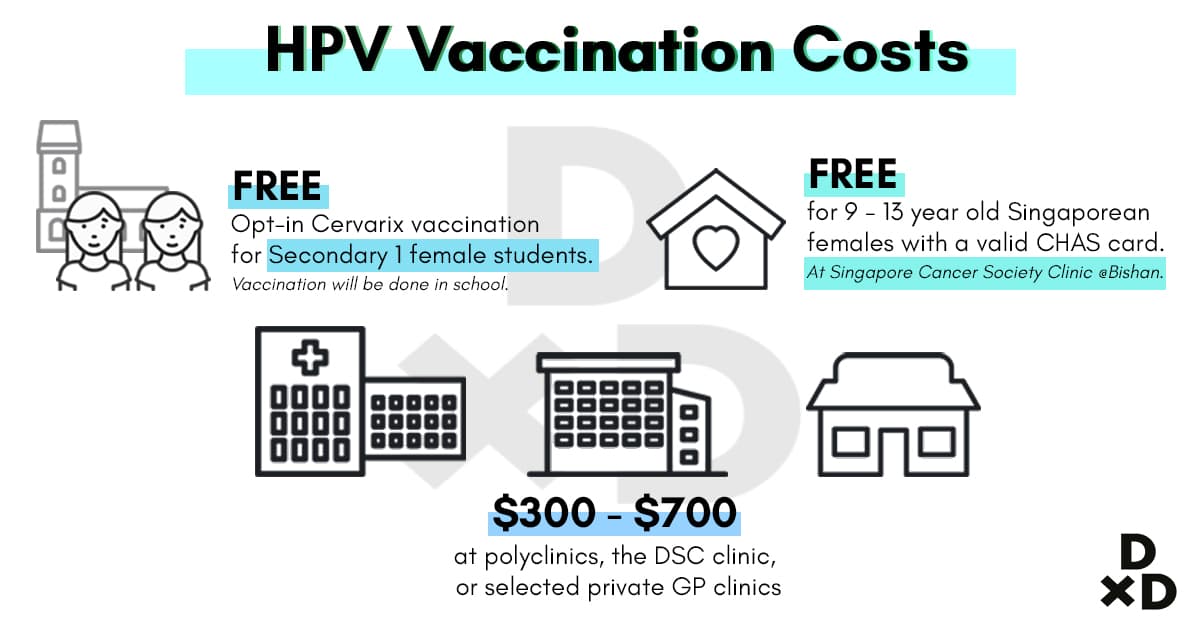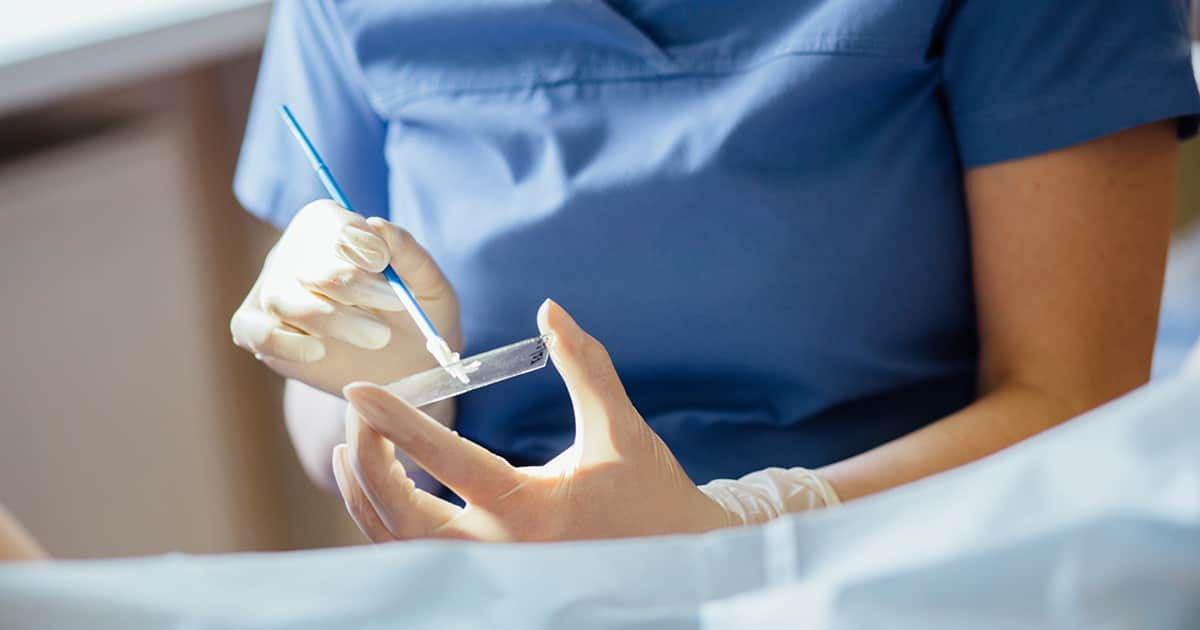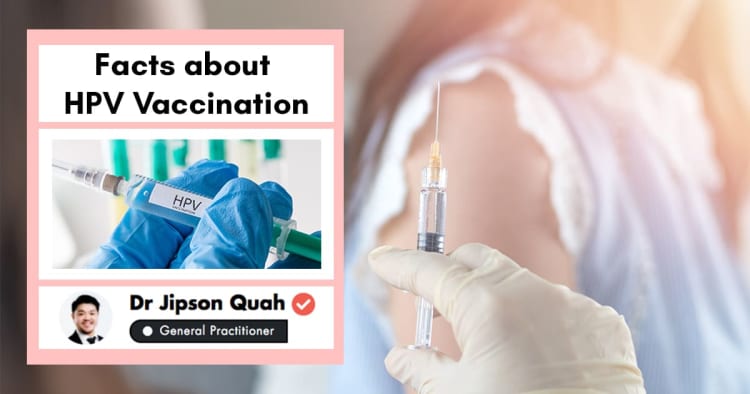You would probably be surprised if I say that HPV Vaccination uptake in Singapore is one of the lowest in the world [1]. A small population study shows that only 9.6% of females aged below 25 have taken the vaccine [2]. That is very low compared to 80% in the UK [1] and 70% in Australia [3].
Read more: The Ultimate Guide to Cervical Cancer Prevention in Singapore.
Listed below are 13 important facts you need to know about HPV vaccination in Singapore:
1. What is HPV?

HPV is the coined term for Human Papilloma Virus. It is so common that it is expected that 8 out of 10 people will get HPV at some time in their life [4]. Most strains do not cause any diseases, but depending on the strain of the virus, it can result in:
- Genital warts in both men and women [5]
- Oral, anal, and penile cancer in men [6]
- Cervical, vaginal, and vulvar cancer in women [7]
2. How is HPV transmitted?

HPV is transmitted through skin-to-skin contact, most commonly during sexual intercourse. Very often, it is transmitted through vaginal, anal, and oral sex. This means that you can acquire HPV even if you use a condom.
Though uncommon, there have been reports of HPV transmission through non-sexual genital contact. Research also shows that HPV can be transmitted from mother to child during childbirth, though this is incredibly rare [8].
Similar to Zika, most HPV infections occur without any signs or symptoms. Even so, they can be transmitted. There is no cure for HPV, but your body is able to clear most low-risk HPV within a few months [9].
Also read: 9 Things Your Doctor Wishes You Knew About Zika
3. Using condoms does not mean full protection

Although the use of latex condoms can prevent the infection, it does not mean you are 100% safe.
Even if you did use condoms during sex, improper usage of condoms can also be a cause of HPV infection [10].
So… make sure you use condoms correctly during any sexual activity!
Here are some pointers that you should take note of when using condoms: [11]
- Use a new condom with each sex act
- Condoms should be put on before any genital, oral, or anal contact
- Only remove condoms when all sexual activity has ended
4. Who is at risk of HPV infection?

Risk factors include:
Sexual Behavior
The risk of transmission is higher in people who have had multiple sex partners. The risk also increases if your partner has had multiple partners [12].
It is interesting to note that the rate of transmission from women to men is higher. This means HPV infection rates in men may actually be higher or at least equal to women [13].
Age
Common warts are mostly found in children [14]. On the other hand, genital warts are more common in young adults. This is even more so during the first few years after your first sexual intercourse [15].
Weakened immune system
HIV/AIDS and immune system-suppressing drugs lower your body's natural immune response. People who have weakened immune systems are at greater risk of HPV infections [16].
Damaged skin
Punctured skin increases the risks of developing common warts [17].
Personal contact
HPV is transmitted through skin-to-skin contact. If you touch someone's warts without any protection, you might have a higher risk of HPV infection [8].
5. HPV vaccination prevents cancer

Out of over 100 known strains of HPV, at least 14 are found to be high-risk and may cause different types of cancer [18]. In reality, HPV infection is found in over 99% of cervical cancer, 97% of anal cancer, 70% of vaginal cancer, 47% of penile cancer, and 11% of oral cavity cancer cases [19].
Type of Cancer
Linked Strain [19]
Cervical
HPV16, HVP18; less commonly HPV45, HPV31, HPV52, HPV35, HPV58
Anal
HPV16, HVP18; less commonly HPV6, HPV11
Vaginal
HPV16, HVP18
Penile
HPV16, HVP18
Oral
HPV16
Cancer is the most common cause of death in Singapore [20]. As a matter of fact, cervical cancer is the 10th most common cancer affecting women [16]. In Singapore, it is expected that 429 women are diagnosed and 208 die from the disease each year [21].
Also read: Dealing With Cervical Cancer: A Women's Gynaecological Cancer Awareness Campaign
Various vaccination research have shown 100% protection to targeted HPV strains. In practice, HPV vaccines may reduce the risks of cervical cancer by 90%. They are also found to be as effective in preventing anal and oral cancer [22].
If I were a salesman and told you that I could offer you a vaccine today that would lower your cancer risk by 90%, I would probably hit my sales target by lunchtime!
6. HPV vaccination benefits both females and males

Genital warts is one of the most common sexually transmitted infections. They can happen anywhere along the genital tract, in both males and females. It is mainly caused by two low-risk strains: HPV6 and HPV11.
Warts infections in males tend to take longer to clear, and thus may have higher chances of spreading. Present warts also put males at a greater risk of penile and anal cancer [23].
I see a lot of patients who have gotten warts. We can freeze them when they appear, but we can never stop them from coming back. They may reoccur as current treatments do not cure the underlying HPV infections.
Luckily, HPV vaccination in Singapore protects both men and women against genital warts. Note that the vaccinate only helps prevent genital warts. It is not a cure for existing HPV infections [24].
An HPV vaccination is important for both females and males. Other than protecting yourself from the risks of genital warts and cancers, vaccination also minimizes the spread of infections.
7. HPV vaccination in Singapore: Gardasil vs Cervarix

There are currently 3 vaccines available in Singapore: Cervarix, Gardasil 4, and Gardasil 9. You can see the picture above for a comparison of the available options.
A course of HPV vaccination would usually require 2 or 3 doses. The dose is dependent on your age or condition so do consult with your doctor. You can check out the general vaccination schedule below.
Two-dose schedule:
Three-dose schedule:
Cervarix
Interval at 0 and 6 months
For females 9-13 y. o.
Interval at 0, 1, and 6 months
For females 14-25 y. o.
Gardasil 4
Interval at 0 and 6 months
For females and males 9-13 y. o.
Interval at 0, 2, and 6 months
For females and males 14-25 y. o.
Gardasil 9
Interval at 0 and 6 months
For females and males 9-13 y. o.
Interval at 0, 2, and 6 months
For females and males 14-25 y. o.
Data from the National Cancer Institute [25] and Healthhub.sg [26].
I would personally recommend taking Gardasil. It covers more strains of HPV and it protects you against genital warts on top of the related cancers.
The UK has switched to using Gardasil in its national vaccination programme since 2012 [27].
8. Side effects of HPV vaccination
HPV vaccination is one of the most studied vaccinations in the world. And as a matter of fact, no studies have shown any evidence of life-threatening side effects.
In extremely rare cases, some may get hives and breathing difficulties. This is likely due to an allergic reaction to yeast or any other a component of the vaccine [28].
If you have any known allergies or sickness, do consult your doctor before getting the vaccination!
Speaking from experience, you might get a bit of redness, itchiness, or soreness in your arms after the injection. This is completely normal for any injections and would usually clear within a day.
9. When should you get vaccinated against HPV?

Ideally, you should be vaccinated before your first sexual contact [25]. This is why most vaccination programmes around the world are targeted to 9 - 14 year olds [29].
The recommended age range for vaccination is 9 – 26 years old for both males and females [26]. This is because most studies have tested the efficacy of the vaccines only for that age group. The dosage required might be different depending on your age so do consult your doctor.
If you are older than 26, the vaccine still confers some degree of protection. Especially if you have never had sexual contact. You can consult your doctor to check your suitability.
Also read: Can I still get the Gardasil 9 vaccine if I am older than 26 years old?
The HPV vaccine is much less effective if you have acquired the infection. Though not compulsory in Singapore, it is recommended that you get your vaccination as soon as possible.
10. How much is HPV vaccination in Singapore? Where can I get them?

You can get your HPV vaccination in Singapore at any polyclinic, the DSC clinic, or selected private GP clinics.
There is an opt-in free Cervarix vaccination for all Secondary 1 girls. For others, depending on where you get your shot, it may cost $300 - $700 in total for a three-shot dose [30].
You can also get the vaccination at the Singapore Cancer Society Clinic @ Bishan. It is free for:
- Female Singaporeans aged 9-13 years old
- Have a valid CHAS (Community Health Assist Scheme) Card
It is a bit costly but for females, you can use up to $500 from your Medisave for your HPV vaccination [31].
11. PAP smear & HPV test is still necessary

The HPV vaccination significantly lowers the risk of cancer but does not guarantee 100% protection [4]. All women aged 25 and above who have had sex should still have a Pap smear at least once every 3 years [32]. This should be routinely done, until age 65.
I would also recommend getting an HPV test. Studies found that they are more sensitive as compared to Pap smear and thus can be taken once every 5 years. If you want to go even further, an HPV/Pap co-testing is also available [33].
How are Pap smear and HPV test different?
- Pap smear screens for abnormal cells in the cervix;
- HPV test screens for the high-risk virus that might cause cervical cancer.
The Health Promotion Board offers subsidies for cervical cancer screening at all polyclinics and participating GP clinics. Under this subsidy, the Pap test will cost around $15 and the HPV test will cost $22.50. You can click here for more information.
There is still a stigma regarding HPV screening in Singapore.
If you do not feel comfortable or just needs the convenience to do it at home, you can opt for a self-administered HPV test. The leverage-based Delphi Screener is available in Singapore for sexually active women aged 30 and above.

Image source: Delphi Bioscience [34]
Follow the instructions on the kit regarding its administration and return it to the clinic for testing. Afterwards, follow up with a doctor consultation regarding the results.
The Delphi Screener tests for high-risk virus, much like the standard HPV test. You should note that at times, they are not as sensitive as the one you would take at a clinic [35].
12. HPV in men

HPV is linked to penile, anal, and oral cancer in men [6]. Main risk factors include sexual behaviour and rates of circumcision.
Male who have sex with male is at 17 times more risk of developing anal cancer [36]. The risk increases even more if you have had multiple sex partners.
Male circumcision lowers the risk of contracting HPV infection and also decreases the risk of transmission. Circumcision also lowers the risk of penile cancer [37].
13. Men's role in managing HPV

Male’s sexual behaviour affects their female partner’s risk of developing cervical cancer. Some men may also affect whether or not their children get vaccinated. Understanding the risks involved in HPV for both males and females is thus very important.
A study found that Singaporean men have moderate awareness of cervical cancer, but poor knowledge of HPV. On top of that, 20% of Singaporean men involved in the study failed to recognize HPV as a serious health concern. Most of them do not know that there is a link between HPV and cancer, and how HPV may also affect males.
HPV rarely shows symptoms. This is why education is crucial in reducing the incidence of HPV-related cancers. The study shows that most men who knew about HPV vaccination are in favour of them. This shows a link between education, awareness, and uptake of vaccination [38].
I researched and wrote about this topic primarily for the benefit of all my friends and family, but I hope reading this spurs you on to talk to your doctor about the HPV vaccine yourself.
Let's make all of Singapore aware of this preventable cancer today.
To find out more about STDs in Singapore, read on to find out about the most common STDs and STD tests in Singapore. Or else read here to find out what a STD clinic visit in Singapore is like.
Dr Jipson Quah obtained his Bachelors of Medicine and Surgery from NUS and has since become a general practitioner with many minor surgeries under his belt. He is interested in creating a connection linking pathologists, speciality clinicians, and patients in order to hone a well-rounded balanced view of the diagnosis.
Read more of Dr Jipson Quah's QnA here.
Would you like to ask any related health questions?
You can Ask A Doctor right away, or request for treatment quotes from doctors.

